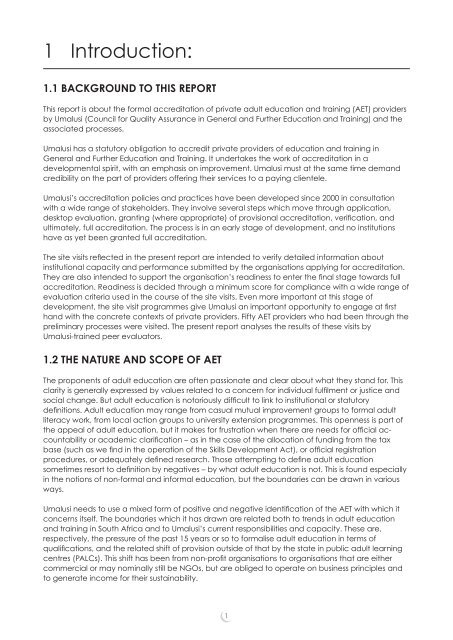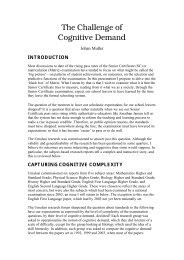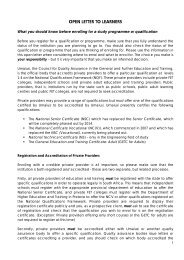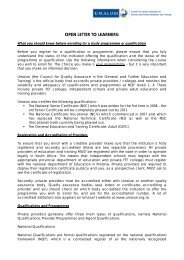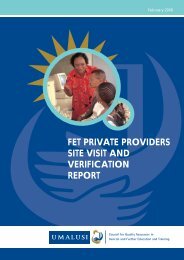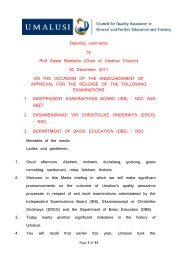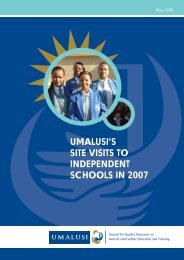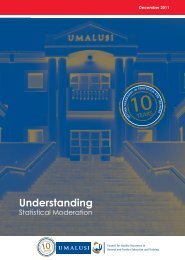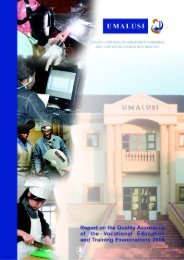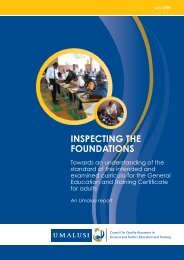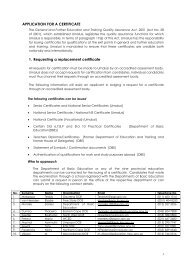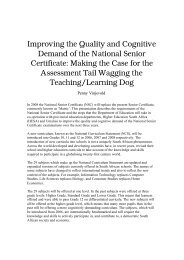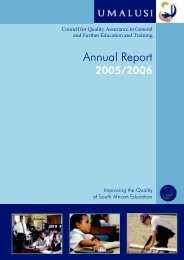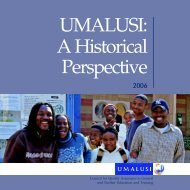Umalusi AET Report
Umalusi AET Report
Umalusi AET Report
- No tags were found...
You also want an ePaper? Increase the reach of your titles
YUMPU automatically turns print PDFs into web optimized ePapers that Google loves.
1 Introduction:1.1 BACKGROUND TO THIS REPORTThis report is about the formal accreditation of private adult education and training (<strong>AET</strong>) providersby <strong>Umalusi</strong> (Council for Quality Assurance in General and Further Education and Training) and theassociated processes.<strong>Umalusi</strong> has a statutory obligation to accredit private providers of education and training inGeneral and Further Education and Training. It undertakes the work of accreditation in adevelopmental spirit, with an emphasis on improvement. <strong>Umalusi</strong> must at the same time demandcredibility on the part of providers offering their services to a paying clientele.<strong>Umalusi</strong>’s accreditation policies and practices have been developed since 2000 in consultationwith a wide range of stakeholders. They involve several steps which move through application,desktop evaluation, granting (where appropriate) of provisional accreditation, verifi cation, andultimately, full accreditation. The process is in an early stage of development, and no institutionshave as yet been granted full accreditation.The site visits refl ected in the present report are intended to verify detailed information aboutinstitutional capacity and performance submitted by the organisations applying for accreditation.They are also intended to support the organisation’s readiness to enter the fi nal stage towards fullaccreditation. Readiness is decided through a minimum score for compliance with a wide range ofevaluation criteria used in the course of the site visits. Even more important at this stage ofdevelopment, the site visit programmes give <strong>Umalusi</strong> an important opportunity to engage at fi rsthand with the concrete contexts of private providers. Fifty <strong>AET</strong> providers who had been through thepreliminary processes were visited. The present report analyses the results of these visits by<strong>Umalusi</strong>-trained peer evaluators.1.2 THE NATURE AND SCOPE OF <strong>AET</strong>The proponents of adult education are often passionate and clear about what they stand for. Thisclarity is generally expressed by values related to a concern for individual fulfi lment or justice andsocial change. But adult education is notoriously diffi cult to link to institutional or statutorydefi nitions. Adult education may range from casual mutual improvement groups to formal adultliteracy work, from local action groups to university extension programmes. This openness is part ofthe appeal of adult education, but it makes for frustration when there are needs for offi cial accountabilityor academic clarifi cation – as in the case of the allocation of funding from the taxbase (such as we fi nd in the operation of the Skills Development Act), or offi cial registrationprocedures, or adequately defi ned research. Those attempting to defi ne adult educationsometimes resort to defi nition by negatives – by what adult education is not. This is found especiallyin the notions of non-formal and informal education, but the boundaries can be drawn in variousways.<strong>Umalusi</strong> needs to use a mixed form of positive and negative identifi cation of the <strong>AET</strong> with which itconcerns itself. The boundaries which it has drawn are related both to trends in adult educationand training in South Africa and to <strong>Umalusi</strong>’s current responsibilities and capacity. These are,respectively, the pressure of the past 15 years or so to formalise adult education in terms ofqualifi cations, and the related shift of provision outside of that by the state in public adult learningcentres (PALCs). This shift has been from non-profi t organisations to organisations that are eithercommercial or may nominally still be NGOs, but are obliged to operate on business principles andto generate income for their sustainability.1


